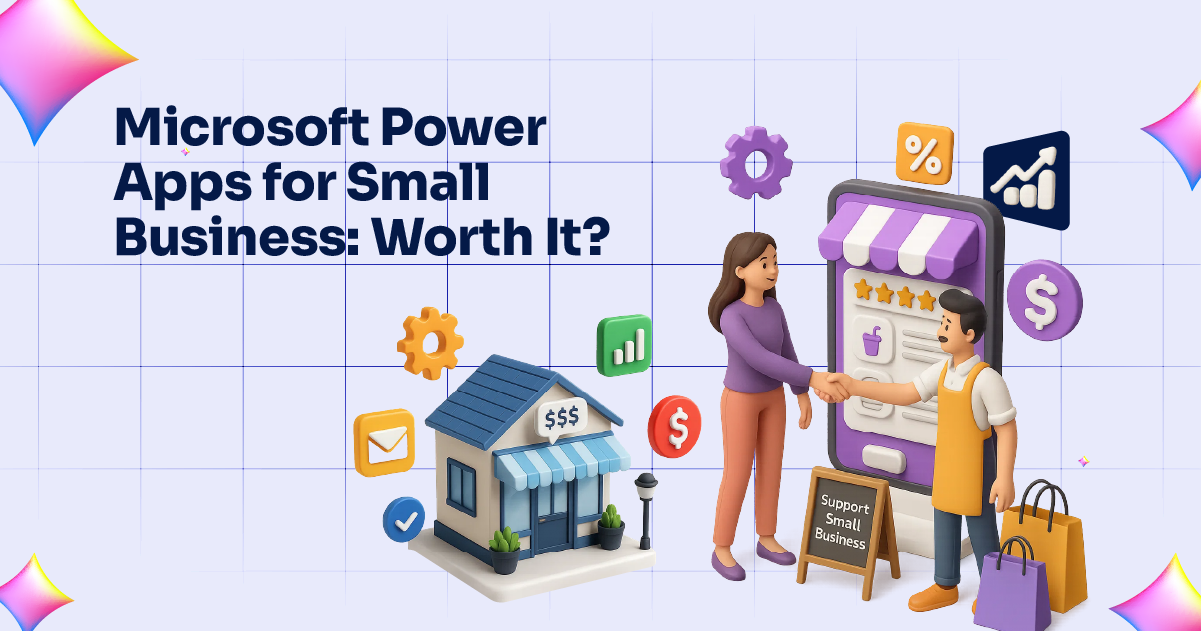
In the fast-paced world of small businesses, staying competitive and agile is key to long-term success. With the increasing demand for customized solutions that can streamline operations and improve efficiency, small businesses are turning to powerful tools like Microsoft Power Apps. But is it really worth it for small businesses? Let’s dive deep into understanding what Microsoft Power Apps is, how it can benefit small businesses, and whether it’s a wise investment.
What is Microsoft Power Apps?
Microsoft Power Apps is a low-code application development platform that allows users to create custom apps without needing deep programming knowledge. It’s part of the larger Microsoft Power Platform, which includes Power BI (for business intelligence) and Power Automate (for workflow automation). Power Apps allows businesses to design custom applications tailored to their specific needs, from data management to task automation and everything in between.
For small businesses that don’t have a dedicated IT team or extensive resources, Power Apps provides an intuitive interface to create applications that solve unique challenges. It helps businesses automate processes, manage data more efficiently, and create a more organized digital environment. But before committing, small business owners need to assess whether it aligns with their business goals and if the investment is worth it.
Key Benefits of Microsoft Power Apps for Small Businesses
1. Cost-Effective Customization
One of the main advantages of Microsoft Power Apps is that it allows small businesses to build custom applications without the need for expensive custom software development. Typically, custom-built applications from scratch can cost thousands of dollars and take months to develop. However, Power Apps provides a low-code environment where businesses can create applications in a fraction of the time and at a fraction of the cost.
For example, a small business owner could easily create a customer relationship management (CRM) app or an inventory management app tailored to their specific needs without hiring a developer. This significantly reduces costs and helps businesses avoid spending on solutions that may not be as effective for their particular processes.
2. Quick Deployment and Easy Updates
Time is money, especially for small businesses. Power Apps enables rapid deployment, allowing businesses to launch apps quickly and start seeing results almost immediately. Additionally, because it’s a cloud-based solution, updates and improvements to the app can be made with minimal effort, ensuring businesses are always using the most up-to-date tools.
3. Integration with Microsoft Ecosystem
Microsoft Power Apps seamlessly integrates with other Microsoft tools, such as Microsoft 365, Teams, SharePoint, and more. For small businesses already using Microsoft tools, this integration ensures that data can flow smoothly between applications without the need for complex configurations.
For example, businesses can create an app that pulls data from SharePoint or Excel and display it in a more user-friendly format. They can also integrate it with Microsoft Teams for collaboration, making it easy to track progress, share updates, and stay connected with team members.
4. Flexibility and Scalability
As small businesses grow, their needs will evolve. Power Apps provides the flexibility to scale up and add more features as required. What starts as a simple app for tracking inventory can later be expanded to include more sophisticated capabilities, such as data analytics, reporting, and even artificial intelligence (AI) integration.
This scalability ensures that Power Apps can grow with your business, which makes it a smart investment in the long term. It allows small businesses to stay nimble and adapt to new challenges without having to overhaul their entire technology infrastructure.
5. Improved Collaboration
Microsoft Power Apps enables better collaboration within teams by providing a platform where employees can easily access and contribute to applications. For instance, a team working on a project can use Power Apps to share progress, update data, and view real-time information in a centralized location. This collaboration improves communication and ensures that everyone is on the same page, which is crucial for small businesses with limited staff.
6. Security and Compliance
With data security being a significant concern for small businesses, Microsoft Power Apps offers robust security features. Microsoft follows strict security protocols, ensuring that data remains safe and that businesses are compliant with industry standards and regulations.
For small businesses that handle sensitive customer data, such as financial information or personal details, Power Apps offers peace of mind by providing built-in security features like encryption, access control, and multi-factor authentication. These features ensure that business data is kept safe from potential breaches or unauthorized access.
Is It Worth It for Small Businesses?
While Microsoft Power Apps offers a wide range of benefits, small businesses need to weigh the investment against their specific needs and resources. Here are some factors to consider before deciding if Power Apps is right for your business:
1. Complexity vs. Simplicity
For businesses with simple processes and limited needs, the complexity of Power Apps may not be necessary. If your business relies on basic tools like Excel or Google Sheets for managing data, the transition to Power Apps might seem excessive. However, if you’re looking to streamline processes and enhance productivity with custom applications, Power Apps could be the perfect solution.
2. Training and Learning Curve
Although Power Apps is designed to be user-friendly, there is still a learning curve involved, especially for those who aren’t familiar with app development or Microsoft tools. Small business owners or employees might need to invest time in learning how to use the platform effectively. Fortunately, there are plenty of online resources, courses, and tutorials available to help businesses get up to speed.
3. Cost of Ownership
While Power Apps is generally affordable, there are costs associated with using the platform, such as licensing fees and potential costs for advanced features. Small businesses will need to evaluate whether the price is justified by the value it brings to the organization. However, for many businesses, the long-term cost savings and increased productivity far outweigh the initial investment.
Conclusion
Microsoft Power Apps offers small businesses an affordable and effective way to develop custom applications tailored to their unique needs. With its integration with the Microsoft ecosystem, flexibility, and cost-effectiveness, Power Apps can significantly enhance productivity and streamline operations.
If your business is looking to automate processes, improve data management, or create a more efficient workflow, Power Apps is definitely worth considering. To get started, it’s advisable to consult with experts or look into additional resources that can help guide you in implementing Power Apps effectively.
For more information about Microsoft Power Apps and how it can benefit your small business, check out Microsoft Power Apps and start exploring the possibilities today!
By investing in the right tools like Microsoft Power Apps, small businesses can gain a competitive edge and position themselves for long-term success in a rapidly evolving digital landscape.
